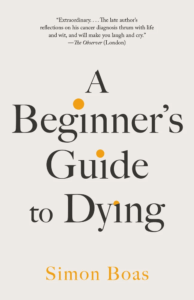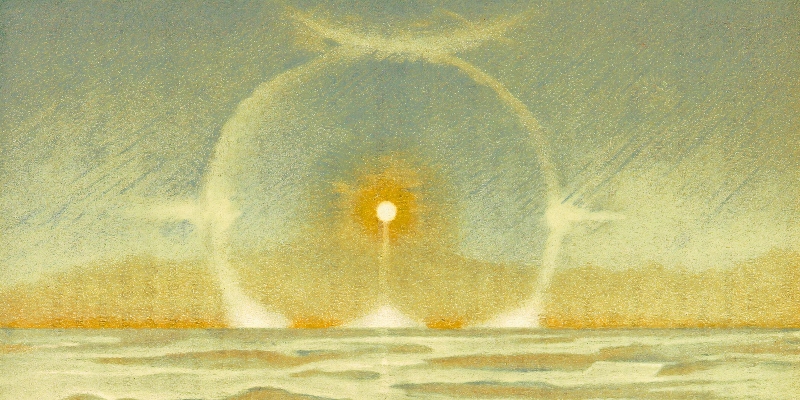It is rightly very popular these days to keep a journal of the things one is grateful for every day, and this has huge power to help us realize how good life really is. But I’ve also found that contemplating two much bigger truths has helped me really realize how enormously lucky I am right now and how lucky I have always been, notwithstanding even the fact that I am dying at 46. These are, first: how fortunate we are to exist at all; and second: how lucky we are to exist when and how we do.
Article continues after advertisement
I think, whether you believe in divine creation or solely in physics (though the two are really not incompatible), there can be no dispute about how fortuitous it is that we are here today as free, conscious entities, able to think and experience and love. Whether it is because some loving, omnipotent, unoriginated Being consciously decided to make the particular farting, mewling, grasping masterpiece that is you, or because a set of cosmic coincidences aligned so perfectly and yet so improbably that Simon Boas resulted, being alive at all is something we don’t appreciate nearly enough.
There can be no dispute about how fortuitous it is that we are here today as free, conscious entities, able to think and experience and love.
I’ve always approached this issue much more from the empirical, scientific side, and yet the conclusion is the same. Any physicist can explain the origins of the universe from a description of big bangs and spacetime and matter, but will also attest to two things: that none of this would have existed but for some pretty spectacular ‘Goldilocks’ coincidences (not too hot and not too cold); and that there are myriad things which not only can’t be explained now, but which may never be.
The universe is fine-tuned for us to exist. As Stephen Hawking wrote, “The laws of science, as we know them at present, contain many fundamental numbers, like the size of the electric charge of the electron and the ratio of the masses of the proton and the electron…the remarkable fact is that the values of these numbers seem to have been very finely adjusted to make possible the development of life.” There are literally dozens of these, and the so-called “anthropic principle” (that there would have to be, otherwise we wouldn’t be here to make that observation) in no way reduces the extraordinary good fortune that the dials were set like that (at least in the bit of the ‘multiverse’ that most scientists need if they want to explain it away), and we are here to observe them.
Add to that, then, the coincidences that made our own green and blue planet possible (literally an aligning of the stars): the ‘golden’ age of the universe, which exists at the only time that small rocky planets could be formed; our stable orbit at exactly the right distance around the right type of star in the right type of galaxy; plate tectonics, a large moon and an atmosphere. And then, even with the conditions just right, the absolute and still-unexplained miracle that life should form, where (to our knowledge and the puzzlement of Enrico Fermi) it clearly hasn’t done nearly as commonly as we might expect. Not just life, but biologically complex, sexually reproducing multicellular organisms, a HUGE leap itself from basic single cells.
Mammals followed, and then monkeys, and then hominins and then us. For me, evolution in no way diminishes us as the most exquisite creatures (perhaps equipped with the greatest computing power) in the universe, and nor does it provide any argument at all against religion. Whether you believe we are its planned, inevitable outcome, or just the accidental result of millions of years of pressures and extinctions and luck, the very existence of humans is something we could be celebrating every day.
And more, our consciousness—the thing that makes us experiencing, subjective, self-aware organisms—is still completely inexplicable. Neuroscientists and philosophers describe it as “the hard problem.” Some—physicists as well as philosophers—quite seriously speculate that in fact consciousness is an inherent property of all matter, while others (more those marinated in Eastern spiritual traditions, but a fair few Western physicists, not least Max Planck) consider that it’s the other way around, and that matter derives from consciousness. Whichever it is, please dwell a little on its wondrousness, and how unbelievably lucky we are to possess it.
Next, then, the thought that puts my own death into perspective is the singular unlikelihood not just of humans existing, but of me being one of them. Richard Dawkins put it brilliantly in Unweaving the Rainbow: “We are going to die, and that makes us the lucky ones. Most people are never going to die because they are never going to be born….We know this because the set of possible people allowed by our DNA so massively exceeds the set of actual people. In the teeth of these stupefying odds it is you and I, in our ordinariness, that are here. We privileged few, who won the lottery of birth against all odds, how dare we whine at our inevitable return to that prior state from which the vast majority have never stirred?”
The chance of your father even meeting your mother, and then of the trillion-to-one chance of that sperm meeting that egg, and surviving to embryo, blastocyst, fetus and then baby (that this is not to be taken for granted is something I am only too familiar with myself, after ten years of fruitless IVF), was astronomically improbable. And then you were born in a place, unlike so many places today (and indeed all countries even a century or two ago), where medicine and care enabled you to live into adulthood. It’s worth dwelling on that particular bit of good fortune too.
I am acutely aware that I had one of the best starts in life available even to modern, Western-born humans. I had loving, well-off parents who could nurture and educate me perhaps as well as was possible in the late twentieth century, so I really was unusually privileged. But even acknowledging the enormous hardships which so many others have had to suffer—abuse and discrimination and loss; poverty and violence and uncertainty—I hope it’s not too tactless for this white middle-class male to make a few observations about how lucky so many of you reading this have probably been.*
It is not the natural state of affairs to live in a society where we can take for granted so many things only dreamt about by previous generations, or those currently growing up in the Central African Republic. In the UK you will not be left to starve or to sleep on the streets with your children. Although it is often poorly provided and very unfairly distributed, you probably have access to pretty decent education and healthcare completely for free. Access to justice too (something often underrated), where you can’t be killed or robbed with impunity, and where you won’t be arbitrarily deprived of your liberty or your freedom of speech by a despotic government. In all likelihood, you won’t die in childbirth, or have simple waterborne diseases take your toddlers from you. And the sheer number of choices you have!
All but the very poorest can choose what to eat tonight from a buffet unimaginable to Louis XIV or a nineteenth century press baron. Your supermarket contains more products than the larders of the Ritz under Auguste Escoffier. And if you don’t fancy that, you can have your food made by a chef and delivered to your door from a choice of dozens of the world’s best cuisines. In fact, though travel isn’t cheap and holidays are out of the reach of many, a lot of people these days can decide to visit almost any country on earth and be there within 24 hours (rather than after ten weeks on a steamer). And you have the entirety of the world’s knowledge available to you in the palm of your hand (plus loads of charming videos of kittens). Try to focus on this, rather than the train strike and library closure and the latest uselessness of your stupid local politicians.
Our glasses are half full, or perhaps even fuller, and, when we remember this, we should be filled with exuberance and gratitude.
We have all won the lottery in life: both to exist at all and to live in the greatest period of abundance in the history of the world. This is why, as I wrote in my second article, that if I should moan that I’m dying at 46 it is as churlish as complaining that I’ve had to share a £2 million lottery prize with another winning ticket. Our glasses are half full, or perhaps even fuller, and, when we remember this, we should be filled with exuberance and gratitude.
*A neurosurgeon called Paul Kalanithi wrote a wonderful book called When Breath Becomes Air about his experience of dying of cancer in his late thirties, just before he’d really had a chance to embark on his medical career. It’s a much profounder reflection than this is on life and death, on the future being snatched away, and on what one can both learn and leave behind. It’s also beautifully written. However, because he’d had a similarly privileged upbringing to mine, I read one review online which just said: “Might as well be called ‘How the Rich Die.’” I feel that’s a tad mean—I hope Paul has regularly returned to hide the car keys of the reviewer—but I know what’s being got at.
The fact is, I have been unusually lucky in the circumstances in which I grew up. Private school, Oxford University—and most of all a loving family and one of those marriages which secretly annoy everyone else because we still hide love notes around the house. I also ended up being a very well-paid aid worker (though I’ve also been broke, and I remember my excitement when I was offered £800 a month for my first salaried charity job).
All of this, of course, helped me choose the paths I took, which are not in reach of everyone. So, me suggesting that you should try things like travel, psychedelics, volunteering, counseling and bucket lists may stick in the craw if, like so many people, you are struggling to make ends meet. It doesn’t feel like I’m being honest if I try to apologize for this, or try to wheedle out of it much more than I did in that last set of brackets, but I am sensitive to it. I just hope that the gist of what I’m writing still makes sense, and that you are not too put off by my background. (The morphine, at least, is free, and the Muscadet is £5 a bottle.)
__________________________________

From A Beginner’s Guide to Dying by Simon Boas. Copyright © 2024 by Simon Boas. Reprinted by permission of Vintage Books, an imprint of the Knopf Doubleday Publishing Group, a division of Penguin Random House LLC.
